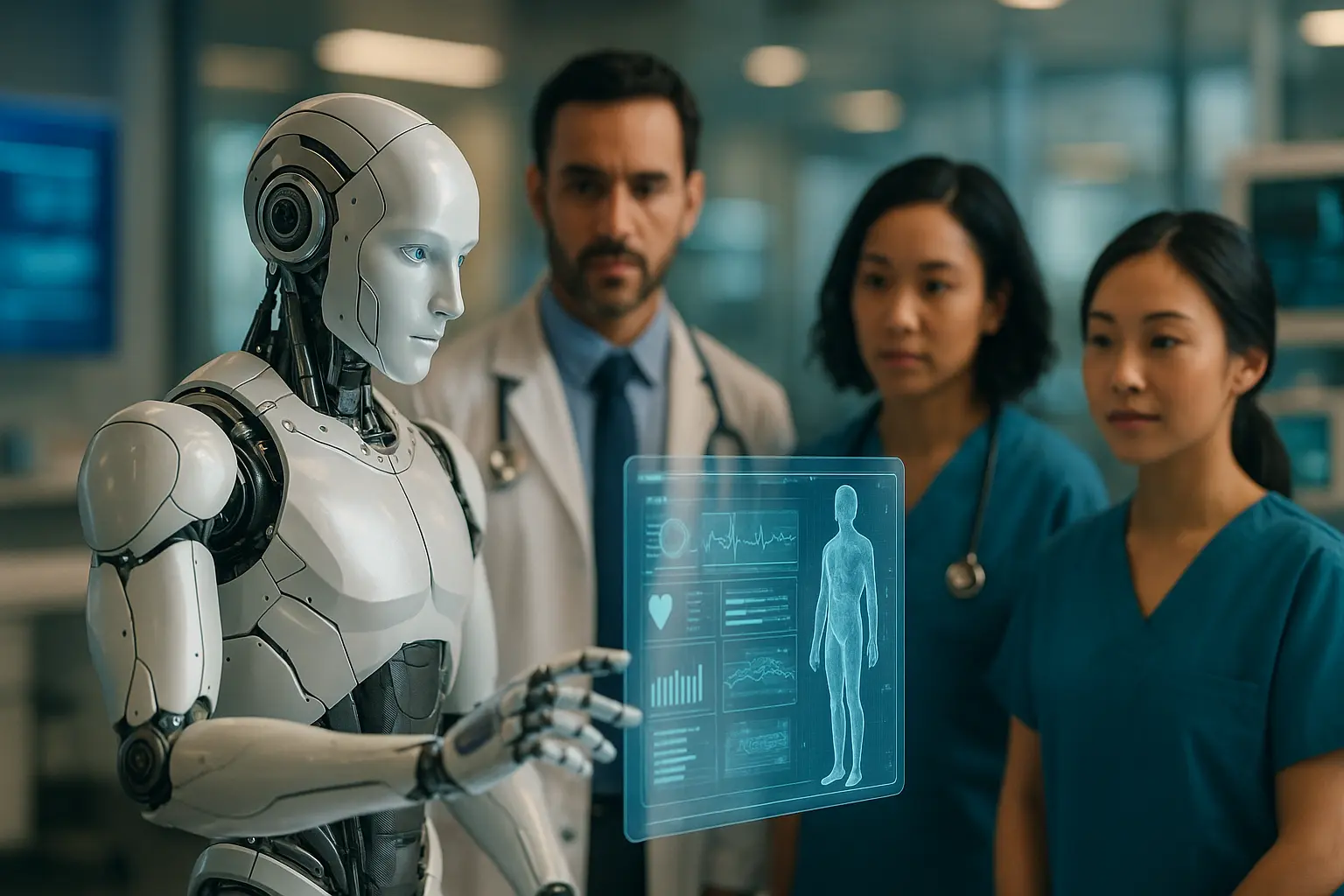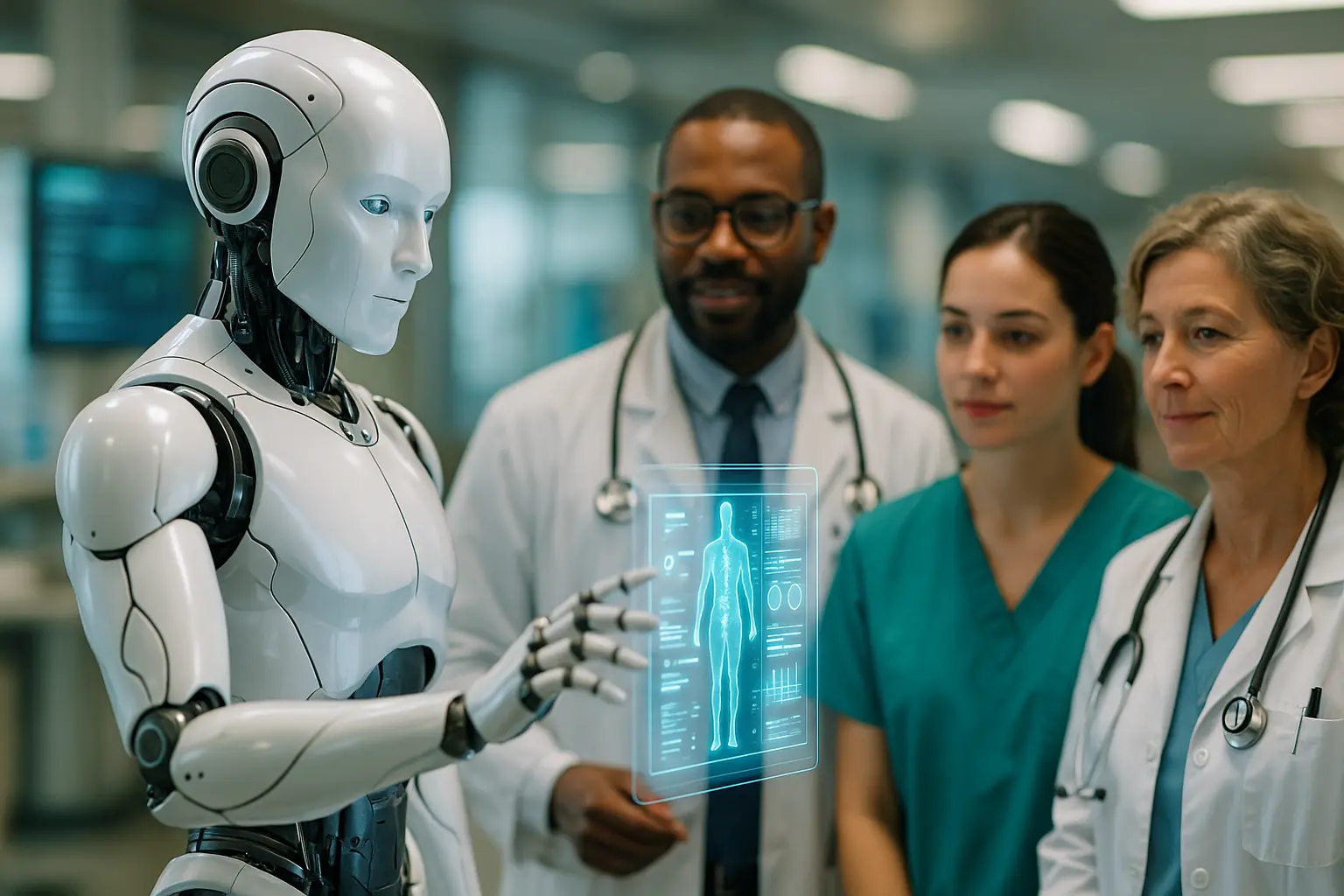The Future of AI in Healthcare: What’s Next?
The world of healthcare is undergoing a profound transformation, thanks to the revolutionary advancements in artificial intelligence (AI). As we navigate through 2025, the integration of AI into medical systems is not merely a concept of the future—it’s happening right now. Artificial intelligence holds the promise of reshaping how we provide care, analyze data, and ultimately, improve patient outcomes. As we delve into this exciting journey, I invite you to explore with us the potential of AI in healthcare, unveiling the next steps in this technological evolution.
AI: A New Frontier in Healthcare
In our rapidly evolving technological landscape, AI presents a new frontier in healthcare, poised to revolutionize how we approach medical challenges. The integration of intelligent systems into hospital settings is transforming traditional practices, offering innovative solutions that were once the realm of science fiction.
AI focuses on understanding vast amounts of health data. With its ability to process and analyze information at unprecedented speeds, AI aids clinicians in diagnostic processes, providing insights that might elude the human eye. A prime example is IBM’s Watson, which has been assisting doctors in diagnosing diseases faster and more accurately, harnessing the power of data to pinpoint potential health issues before they escalate.
However, the true potential of AI lies beyond diagnostics. With the ability to mimic human cognition, AI systems can personalize patient care. Consider an AI-driven platform that can tailor medical treatments based on an individual’s unique genetic make-up. This approach not only enhances the efficiency of care but also significantly improves patient satisfaction.
Moreover, AI’s role in healthcare extends to operational efficiency. Automating routine tasks, from appointment scheduling to patient record management, allows medical staff to dedicate more time to direct patient care. This shift not only increases productivity but also empowers healthcare professionals to focus on their primary responsibility—improving patient health.
The future of AI in healthcare is characterized by its potential to redefine every aspect of patient care. As we continue to explore this promising horizon, the question remains: How can we best integrate these technological advancements to ensure a better, healthier future?
Harnessing AI for Predictive Analytics
The potential of AI in healthcare extends beyond immediate care—it ventures into the realm of predictive analytics. Imagine a healthcare system capable of forecasting health trends, predicting disease outbreaks, and identifying at-risk populations before they even step into a clinic. This is the future that AI promises.
Predictive analytics leverages historical and real-time data, employing sophisticated algorithms to discern patterns and anticipate future health outcomes. By analyzing patient records, lifestyle data, and even social determinants of health, AI can offer predictive insights that empower both healthcare providers and patients.
One significant application of this technology is in the early detection of chronic diseases such as diabetes and cardiovascular disease. By recognizing patterns indicative of disease onset, medical professionals can initiate early interventions, thereby improving prognosis and reducing long-term healthcare costs.
Moreover, AI-driven predictive analytics can assist in hospital management by forecasting patient admissions and optimizing resource allocation. This foresight allows healthcare facilities to manage their operations more efficiently, reducing wait times and enhancing patient experiences.
As we embrace the potential of AI in predictive analytics, we must also consider the ethical implications. Ensuring data privacy and maintaining patient trust are paramount as healthcare systems become increasingly reliant on AI for decision-making. By striking a balance between innovation and ethical responsibility, we can harness AI to not only predict the future of health but to actively shape it.

AI and Personalized Medicine
Personalized medicine, often hailed as the holy grail of healthcare, is coming to life through AI. With its ability to analyze data at granular levels, AI is transforming the one-size-fits-all approach to treatment into a tailored journey for each individual.
At the heart of personalized medicine is AI’s capacity to process and interpret genetic data. With the advent of genomic sequencing, we can now understand how specific genes influence a person’s response to certain medications or their susceptibility to diseases. AI’s analytical prowess enables us to harness this information, crafting personalized treatment plans that maximize efficacy while minimizing adverse effects.
Furthermore, AI is instrumental in monitoring patient responses to treatment over time. By continuously analyzing patient data, AI systems can make real-time adjustments to treatment plans, ensuring that patients receive the most effective care.
AI’s role in personalized medicine extends beyond treatment to prevention. With its ability to predict potential health issues based on genetic and lifestyle factors, AI empowers patients to make informed decisions about their health long before any symptoms manifest.
However, the journey toward personalized medicine is not without challenges. Ensuring equitable access to these advanced technologies is crucial, as is navigating the regulatory landscape to ensure patient safety. As we continue to explore the potential of AI in personalized medicine, our focus remains steadfast: achieving a future where healthcare is not just about treating diseases, but about understanding and caring for individuals.
As we stand at the cusp of a new era in healthcare, the potential of AI is both exhilarating and awe-inspiring. From diagnostic support and predictive analytics to personalized medicine, AI is reshaping the healthcare landscape in ways we never thought possible.
Yet, as we continue to unravel the promises of AI, we must remain vigilant in addressing the challenges that accompany this transformation. Ensuring data security, maintaining patient trust, and navigating the ethical dimensions of AI use are crucial steps in charting a successful path forward.
Our collective journey with AI in healthcare is just beginning. By fostering collaboration between technology innovators, healthcare providers, and policymakers, we can maximize the benefits of AI while safeguarding the values that underpin our healthcare systems.
The future is bright, and AI is guiding us toward a new paradigm of healthcare—one that prioritizes efficiency, personalization, and compassionate care. As we look ahead, let us embrace the potential of AI to not only transform healthcare but to redefine what it means to care for our communities.
FAQ
What are some potential benefits of AI in the healthcare industry?
AI has the potential to revolutionize healthcare through improved diagnostic accuracy, personalized treatment plans, enhanced operational efficiencies, and better patient care outcomes. It can assist clinicians by analyzing large datasets to identify trends and predict patient risks.
How might AI impact the role of healthcare professionals?
AI is expected to act as a supportive tool for healthcare professionals, allowing them to focus more on patient care by automating routine tasks and providing data-driven insights. It will likely lead to a shift in responsibilities, with professionals taking on more supervisory and decision-making roles.
What challenges could arise with the integration of AI in healthcare?
Implementing AI in healthcare can present challenges such as data privacy concerns, the need for high-quality data, potential job displacement, and the necessity for continuous updates and maintenance of AI systems. Moreover, there is the ethical consideration of AI decision-making in patient care.
How can AI contribute to personalized medicine?
AI can analyze a patient’s genetic makeup, lifestyle, and environmental factors to tailor treatments specifically to the individual. This approach can lead to more effective interventions, fewer side effects, and a better understanding of diseases at a personal level.
What is the future outlook for AI in healthcare?
The future of AI in healthcare is promising, with ongoing advancements expected to further enhance diagnostic tools, treatment plans, and patient monitoring systems. Innovations will likely lead to more integrated healthcare systems, facilitating collaborative efforts between AI and human professionals to improve patient outcomes.














Post Comment